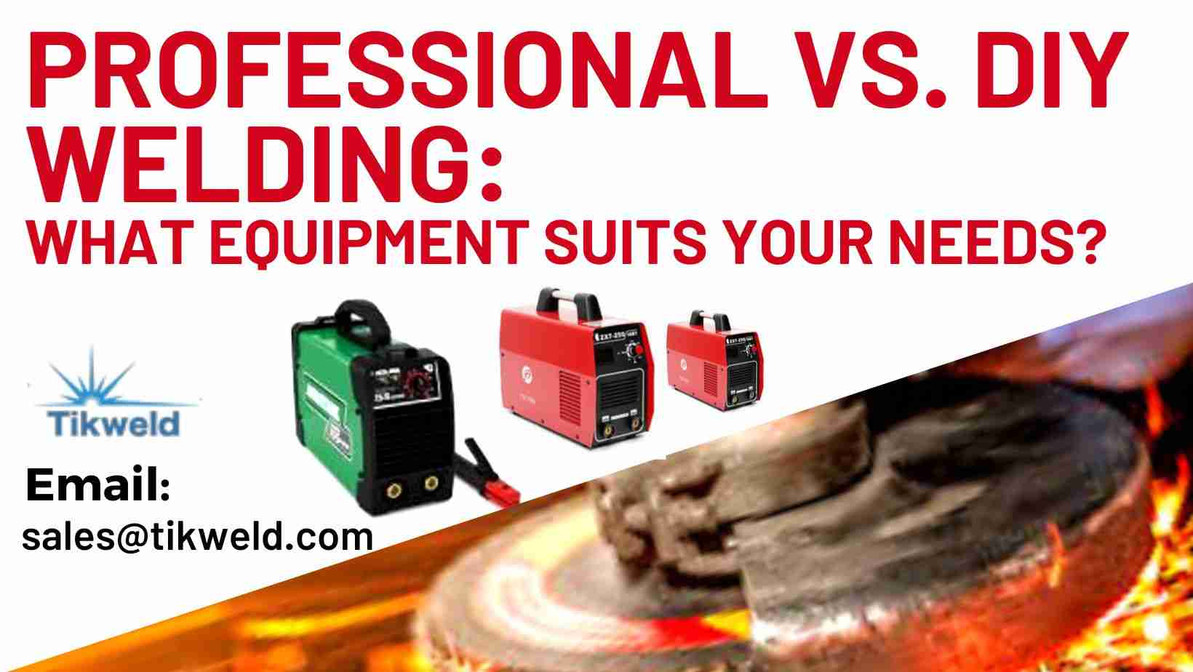Professional vs. DIY Welding: What Equipment Suits Your Needs?
When it comes to deciding between professional and DIY welding, it is important to consider your specific needs, level of expertise, and the intended use of the equipment. Other factors include the complexity of the projects you undertake, and your budget.
Professional welding equipment is typically designed for heavy-duty usage and can meet the demands of high-quality welds in industrial or commercial settings. These machines are often more durable, powerful, and versatile, allowing professionals to work on a wide range of materials and tackle complex projects. They may also offer advanced features like programmable settings, precise controls, and multiple welding processes.
On the other hand, DIY welding equipment is often more compact, affordable, and user-friendly for hobbyists or casual users. These machines are designed to be lighter and more portable, making them suitable for smaller projects at home or in a workshop. DIY welding machines may have simplified controls and fewer advanced features, but they can still provide adequate performance for lighter welding tasks on materials like steel or aluminum.
Let's compare the equipment and considerations for both professional and DIY welding:
Kaierda Electric Welding machine WN-315N
Professional Welding:
- Equipment:
- Welding Machines: Professionals often use high-quality, industrial-grade welding machines that offer precise control over parameters like voltage, amperage, and wire feed speed.
- TIG (Tungsten Inert Gas) Welders: Common in professional settings for its precision and versatility in welding various metals.
- MIG (Metal Inert Gas) Welders: Efficient for high-volume work and well-suited for welding thick materials.
- Safety and Compliance:
- Safety Standards: Professionals adhere strictly to safety standards and regulations. This includes using personal protective equipment (PPE) and ensuring a safe working environment.
- Certifications: Professional welders often hold certifications to demonstrate their skills and knowledge.
- Project Complexity:
- Industrial Applications: Professionals typically handle complex and large-scale projects, such as structural welding, pipeline welding, or fabrication for heavy machinery.
- High Precision: Some projects require a high level of precision, which professional equipment can provide.
- Cost:
- Higher Initial Investment: Professional-grade welding equipment can be expensive. However, for businesses or individuals with frequent and demanding welding needs, the investment may be justified.
Maxmech Inverter Welding Machine TIG/MMA-400
DIY Welding:
- Equipment:
- Entry-Level Welders: DIY enthusiasts may opt for less expensive, entry-level welding machines suitable for small to medium-sized projects.
- Stick Welders: Common among hobbyists for its simplicity and affordability.
- Safety and Training:
- Basic Safety Precautions: DIY welders should also prioritize safety by using PPE, proper ventilation, and following safety guidelines.
- Training: While professional training is beneficial, many DIY welders start with online resources, books, or community workshops.
- Project Complexity:
- Home Projects and Repairs: DIY welding is often sufficient for home repairs, small projects, or hobbies. It may not be suitable for highly specialized or intricate work.
- Cost:
- Lower Initial Investment: DIY welding equipment is generally more affordable, making it accessible to hobbyists and those with occasional welding needs.
Electrical welding machine Inverter 155 Super Askaynak
Considerations:
- Skill Level:
- Professionals: Extensive training and experience are crucial.
- DIY: Beginners can start with simpler projects and gradually progress.
- Frequency of Use:
- Professionals: Regular use justifies the investment in high-end equipment.
- DIY: Occasional use may not require top-tier equipment.
- Project Size and Complexity:
- Professionals: Handle larger, more intricate projects.
- DIY: Suited for smaller-scale tasks and hobbies.
- Budget:
- Professionals: Consider long-term ROI and efficiency.
- DIY: Focus on affordability for occasional use.
Maxmech Inverter Welding Machine TIG/MMA-250
Conclusion
The choice between professional and DIY welding equipment ultimately depends on your level of experience, the nature of your projects, and your budget. If you are a professional welder or plan to work on demanding projects regularly, investing in professional-grade equipment is recommended. However, if you are a hobbyist or occasional user with simpler welding needs, a DIY welding machine may be more suitable and cost-effective.
Remember that no matter which type of welding equipment you choose, it is essential to prioritize safety by following proper welding techniques, wearing protective gear, and working in a well-ventilated area.
Related Articles:
Welding in Harsh Environments: Tips and Best Practices
How to Maintain and Care for Your Welding Equipment
Troubleshooting Common Welding Problems: Expert Tips and Solutions
The Evolution of Welding Technology: Past, Present, and Future
The Role of Welding in Modern Construction and Manufacturing
Recent Posts
-
Why Dakota Lithium Batteries Are the Best Choice for Your Power Needs
In situations where reliable power is essential, Dakota Lithium batteries stand out as a superior ch …18th May 2024 -
Long-Lasting Power: Why Dakota Lithium Batteries are Perfect for Everyday Devices
In today’s fast-paced world, reliable power sources are essential for personal and professional appl …18th May 2024 -
How do you plug a generator into your house?
In Nigeria, where power outages are frequent, understanding how to safely and effectively connect a …11th May 2024






